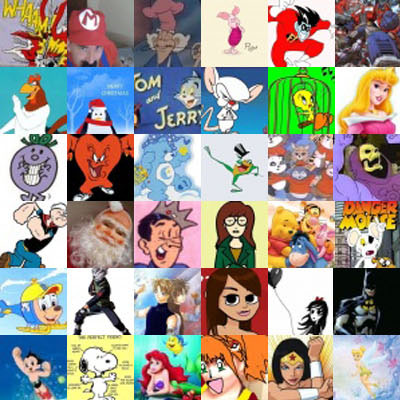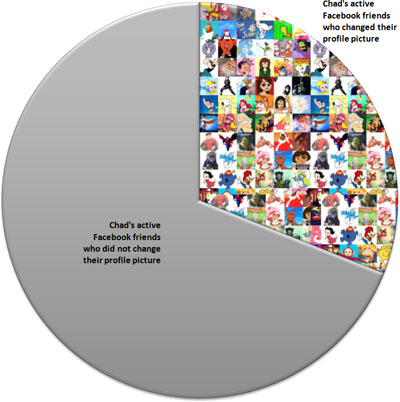Measuring a meme: Did 32% of active Facebook users change their profile picture to a cartoon to stop child abuse?
A recent Facebook meme asked people to change their profile pic between 3 to 5 December to a cartoon to end violence against children. My ad hoc research shows that a potential 32% of people changed their profile picture to raise awareness for child abuse… or because they felt like it… or because their friends did it… or because it was fun. Wait… why did we do this again?

Measuring meme effectiveness
Effectiveness is a measure of how well a given action meets the intended objectives. A challenge with this meme is that the objective of “raising awareness” was difficult to measure. More tangible outcomes are typically increasing traffic or increasing spend (in this case, giving).
The movement appeared to increase traffic. A couple of sites here and here mention an increase in traffic to sites related to addressing child abuse, with one site seeing a 567% increase from 3,000 to 20,000 in one day.
However, this traffic did not necessarily translate into increased giving. The same articles note that giving increased slightly, but it is difficult to differentiate from the normal seasonal variance.
The main barrier to these outcomes is the lack of a single point call to action. As Sydney-based Westfield discovered in last year’s gift card competition fiasco, the international aspect of the Facebook platform needs to be considered for local giveaways.
Child abuse is typically addressed at a local level by national organisations. The effectiveness of the campaign could have been improved exponentially by a call to action to a single-page website directing users to a selection of national relevant organisations.
Another barrier is those looking to hijack the hijack, destroying the trust that is so critical in getting others to pass on a message. A rumour started shortly after meme inception that paedophiles were behind the meme. Finally, there were the anti-establishment voices who refuse to change their picture just to prove a point.
The real objective: Have fun in community
I believe the real objective of the meme was to have a bit of fun and feel better about ourselves by doing something that makes us feel good at little to no personal cost. This was easy to measure if the objective was just to get people to change their pictures.
On Monday morning, 35 of my friends had cartoon avatars (14.11%). To see if it was just my friends, I looked at one of my friends with 454 friends, who had 68 friends with cartoon avatars (14.98%). Another friend has a whopping 1,354 friends, of which 150 had cartoon avatars (11.08%).
We also have to consider the many people who have Facebook accounts but who are not active users. Of my 248 friends, only 100 had activity over the weekend of the meme. Of those, 33 had cartoon memes. If 35 of all my friends had cartoon avatars, two already had a cartoon as an avatar. We thus change our statement from “14% of all Facebook users changed their profile image” to “32% of active Facebook users changed their profile image”.
While I tried to test for generalisation by looking at other profiles, I can only see friend lists of my friends. This means we will get cross-pollution. As such, we can only truly state “32% of Chad’s active Facebook friends changed their profile image.”

Like any social experiment, the outcomes raise more questions. Who were the champions whose profile change prompted others to do the same? What is the percentage of changed images that represents the tipping point? What is the propensity to change based on age or gender? Which characters are more popular: Marvel comics, DC comics, or Disney? Do people select characters based on popularity, or a desire to be unique? Did people change their profile because they cared about the cause, or they wanted to be seen as caring for the cause? Did anyone even think about the fact we were all infinging on copyright?
All interesting questions we may never have answers to, but there are some good take aways from the experiment.
Bottom line: Fun is not enough, make me look like I care
Facebook is a powerful tool to share a movement through community, but it takes finesse and psychology to get it right.
Simply making your movement fun is not enough, as everyone has different definitions of fun. Identity is defined in part by our assumptions of other’s perceptions of us. Tap into a cause to make me feel good about others seeing me as being good.
And above all, give me a strong call to action.
If you run a campaign, please:
- let me have fun,
- allow me to feel good about what I am doing, and
- don’t make me think about it too much.
I have enough on my mind pondering my next witty post about what I am having for dinner tonight.
Stop the violence?
I am doubtful that looking at cartoon avatars will impact violence against children. However, in the event I am wrong, please feel free to spend time perusing the data below from my research.


I think this pretty much comes down to the concept of social proof and how we wish to be perceived. Social proof being akin to people looking at the to of a building and others following Quote “Others were doing it so why shouldn’t I?”. The second part is that if we would like to be perceived as taking action against something like child abuse then we will take socially sanctioned, but not risky actions. I can recommend Influence by Robert Cialdini as a well written explanation for this phenomenon.
Like your work BTW.
Hi Lyndon,
Thanks for the recomendation, I will have a look! Persuasion is a fascinating topic. I recently finished a focus on transformation, charasmatic and servant leadership, which led me towards persuasion and the societal manipulation of our ideal identities. The application of a small portion of psychology into social media is a scary thing. 🙂
Chad
Thanks for posting your findings! I have been looking for numbers like these and have found little to nothing!
If you see more please keep posting!
Happy New Year!
Hi Justin,
No worries. The challenge is to have the awareness to capture the results of a meme as it happens. They so often slip by and not one measures what jkust happened.
Thanks for commenting!
Chad